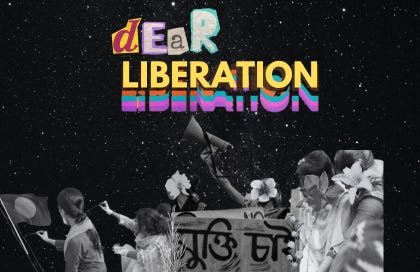Rooted in love and solidarity
The Bangladesh Womxn's Collective is small, strategic and they organize from a place of love; something we miss and overlook in most Global South collective liberation movements.
In 2017, Sheila Cabusao, originally from the Philippines, moved to Bangladesh and brought along her background in women's rights mobilizing to a new cultural context. That’s when the first seed of the Collective bloomed.
"We started working and we actually started with training. That was our entry point. We invited mostly university students and young people from different communities where the organization has partners," reflects Sheila. "We started providing them with training on the basic concept of feminism. But just, you know, like for sure you're aware that in this part of the world, like even anywhere, there are a lot of stereotypes around this concept."
These early conversations grounded their ongoing work beyond the lifecycle of typical NGO projects."Some of [the communities] stayed because they resonated with the movement. We feel like this is something that we really want to work. It's important to many of us, and we want to continue this initiative by and with the womxn of Bangladesh" Sheila explains.
A balancing act
Unlike more visible women’s rights organizations that engage in protests and direct action, the Collective adopts careful, alternative approaches prioritizing member safety through a radical feminist lens. This means developing resources in Bangla, hosting informal gatherings, and building artistic collaborations.
"Our approach is a little different because we are also thinking of the safety of our members," notes Sheila.
"Last year, we published a translated glossary about feminism and the LGBTIQ people’s historical and current livelihoods in the Bangladeshi context. It was a long process. Sure, there are definitely resources available online from other organizations. But we though, maybe we need to infuse a more local context so that people would really appreciate and understand it."
For the Bangladesh Womxn's Collective, liberation manifests through gradual wins. This can look like grassroots community feeling affirmed and empowered. Their work underlines the importance of celebrating progress no matter how big or small while also recognizing threats and harms.
"I think that's also what we always try to kind of, you know, celebrate small wins, right?" Sheila reflects. "For example, recently, there was an issue around shutting down a store in a book fair that sold sanitary napkins. And there was a huge uproar around it online... But our members were like, you know what, we need to do something. We need to respond on social media. For us, it's already kind of a liberating process because it kind of empowers people to really speak up for some issues."
One of the collective's uphill battles involves balancing visibility with safety, particularly for queer community members. This calls for a thoughtful consideration of how to do advocacy work without endangering the very communities that are organizing them.
"The conversation around the non-binary [gender] is risky. That's why we are not encouraging them to be out there for their own safety. Unless they give consent that, no, it's okay, I want to be identified, then it's fine," Sheila explains. "In our small ways, I feel like we are trying our best to still communicate the issues because we are not a big organization where we can depend on ourselves when there are security threats."
Creative organizing
The Collective has increasingly turned to artistic expression as the core medium for advocacy, particularly for addressing sensitive topics surrounding gender and sexuality.
"When we engaged these students last year and started our initial conversation with them, they were also not very much aware of the community," Sheila recalls. "But when they heard the stories directly from non-binary folks who we engaged with, they sort of started processing and challenging their thinking as well."
Sheila believes that using a creative approach opened spaces for deeper expression and dialogue that might otherwise be difficult to uphold through more traditional advocacy methods. building bridges between different community members.
Love is the foundation
At its core, the Bangladesh Womxn's Collective operates from a foundation of love and solidarity. The emotional connections between members sustain their work through challenges and create a nurturing environment amid external pressures.
"Being in a movement, it's also challenging. It takes a lot of patience, right?" reflects Sheila. "I think you cannot really say that you can stay in the movement without love. Because it comes from the passion and the belief that, you know, I need to do something."
This ethos extends to their organizational practice: "The most important thing, too, is that we try to also advocate for or integrate self and collective care within our collective. So, we always try to touch base on our feelings and emotions and how we are and how we can support each other."
Reimagining liberation
When asked what she would say to liberation if it were a person, Sheila's answer reveals both yearning and vision for a transformed world:
"I would really say and ask that person when actually we have all been liberated like that person. Because I feel like we live in a society at the moment where liberation is some sort of an imagination only... I hope it's that person can just, you know, bring us up together and be on that side so that we can all be free. We can all, you know, be who we are. We can express ourselves freely. We can dress whatever we want. We can, you know, move around wherever we want."
For the Bangladesh Womxn's Collective, the pursuit of this vision continues—one conversation, one artistic collaboration, one glossary term at a time—as they build toward a more liberated future.





Activism is love 🫶🏼 my rationale for stepping into activism formally, was because of love. Thanks for reminding me with the insights from the Bangladeshi Womxn’s Collective